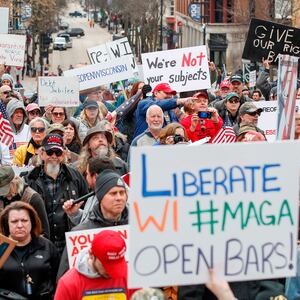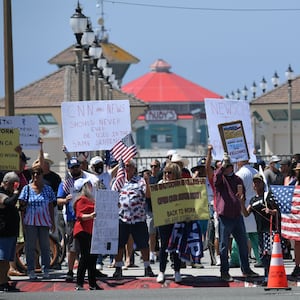The Wisconsin Supreme Court made sure it was not exposed to COVID-19 as it heard arguments regarding the safer-at-home order intended to slow the spread of the virus that had already infected 11,000 in the state and killed more than 400 of them.
“Arguments will be conducted with all participants making appearances via Zoom,” Chief Justice Patience Roggensack decreed before the May 5 hearing.
Nobody risked community spread as attorneys representing the Republican-controlled legislature argued via video that the shutdown order issued two months ago by Democratic Gov. Tony Evers and the state Department of Health Services (DHS) was unconstitutional. DHS attorneys Zoomed back that such measures were within its powers during an emergency, noting a particularly alarming spike in Brown County.
“These were due to the meatpacking, though,” Roggensack said, referring to infections in the low-wage workers who staff meat factories. “That’s where Brown County got the flare. It wasn’t just regular folks in Brown County.”
Another justice in the court’s 4-3 conservative majority compared the safer-at-home order to the internment of people of Japanese ancestry during World War II.
“Isn’t it the very definition of tyranny for one person to order people to be imprisoned for going to work?" Justice Rebecca Bradley tele-inquired.
On Wednesday, the court ruled 4-3 that the order was unlawful. Nobody could have been more pleased than anti-shutdown protesters who gathered last month outside the Capitol, home to the legislature, and also the Supreme Court.
Never mind that 72 people who have since tested positive for COVID-19 told health officials they had recently been at a large gathering. The state immediately went from shut to open.
That included the bars, which had been closed since St. Patrick’s Day. The Brown County Tavern League put out the word to its members, among them Marty Leonhard of Lenny’s Tap in Green Bay.
Past customers at Lenny’s Tap included 58-year-old Todd Chartrand, the first person in Brown County to die of COVID-19. Chartrand was what Roggensack would have called “regular folk,” a mechanic and a fan of the Green Bay Packers, but not a meat packer. He fell suddenly ill at the end of March. He died on April 9, just as infections at meat plants were turning the county into a hot spot.
“I went to high school with him,” Leonhard told he Daily Beast.
But Leonhard figured there is adequate safety in washing your hands and keeping alert for anybody who might cough or sneeze on you. He was not to be dissuaded by warnings from infectious disease experts such as Anthony Fauci that heedless reopening invites many more deaths.
“I can't believe it,” Leonhard said.
Lenny’s had gone 16,332 straight days without closing from its 1975 opening to the March 17 shutdown, which Leonhard figured would last maybe two weeks. That had become two months and he no sooner got the word of the court ruling while at home Wednesday than he was in his car.
“I probably could have gotten a speeding ticket, but I was in a hurry to get there and get the door unlocked,” Leonhard said.
He had no sooner opened up than customers began trooping in.
“Everybody was looking at each other like it was Christmas,” Leonhard reported.
The new normal briefly became the old one. And there is no way to drink beer with a mask on, anyway.
“We had a real good crowd,” Leonhard said.
But three hours into it, the Tavern League notified Leonhard that the Brown County Health Department had instituted a shutdown order of its own identical to the one the state Supreme Court had invalidated. He relayed the news to the crowd and heard the predictable groans.
“Can we get one more before we go?” a customer called out.
“I don’t care,” Leonhard replied. “If they’re going to arrest me, they’re going to come anyway.”
On Thursday, Leonhard noted that bars in Kewaunee County just 5 miles away were still open. He heard that at least the police in Green Bay were saying they would simply notify the local health department if they saw places defying the Brown County order.
“If someone’s fighting in a bar, of course we’re heading in there,” Green Bay Police Chief Andrew Smith confirmed to The Daily Beast. “But, we’re not going in there because a bar happens to be open and there are eight people there.”
Leonhard figures he will remain closed, at least for now.
“I don’t want to be a target,” he said.
Meanwhile, the Wisconsin Supreme Court has an order posted that future proceedings will be conducted in the safety of Zoom.
The lower courts largely do the same, with some exceptions, mainly serious criminal matters such as a hearing on Thursday involving a horrific child abuse case in Manitowoc County.
In a photo taken of that proceeding, masks are as absent as in the pictures from the bars after Wednesday’s statewide reopening.
Be it in a courtroom or a gin mill, the threat of the unseen but deadly is too often forgotten once restrictions are lifted.



